Top 10 Fashion Brands in America
The United States is home to a diverse array of fashion brands, each with its own unique style and appeal. These brands have made a significant impact on the global fashion landscape, influencing trends and shaping the way people dress. Here’s a breakdown of the top 10 fashion brands in America, exploring their history, signature styles, and contributions to the fashion world.
These ten brands represent just a fraction of the vibrant American fashion scene, each contributing to the country’s unique and diverse sartorial identity. From iconic sportswear giants like Nike to luxury powerhouse brands like Michael Kors, American fashion continues to influence and inspire the world.
1. Nike

Nike, the iconic swoosh brand, stands as a global leader in athletic apparel and footwear, synonymous with performance, innovation, and inspiration. Its unwavering commitment to pushing the boundaries of what’s possible has transformed the world of sports and shaped the landscape of everyday fashion.
A History of Innovation
Nike’s story began in 1964 when Bill Bowerman, a track coach, and Phil Knight, a business student at the University of Oregon, joined forces to create shoes that would give athletes an edge. Their passion for innovation fueled their relentless pursuit of performance-enhancing designs, leading to groundbreaking advancements in footwear technology.
In 1971, Nike introduced the revolutionary Waffle Trainer, featuring a sole inspired by Bowerman’s observation of waffle irons. This innovative design provided superior traction and marked a turning point in the company’s history.
Over the decades, Nike has continued to push the boundaries of innovation with a series of groundbreaking technologies, including:
- Air technology: Encapsulated air pockets in soles provide lightweight cushioning and shock absorption.
- Flyknit technology: Lightweight, breathable, and supportive fabric that conforms to the foot’s natural shape.
- Dri-FIT technology: Wicks moisture away from the body, keeping athletes cool and dry.
A Force in Sports and Fashion
Nike’s impact extends far beyond the world of sports. Its iconic designs have transcended the athletic arena, becoming a staple in everyday fashion. The brand’s signature sneakers, such as the Air Force 1, Air Jordan, and Cortez, have become cultural icons, worn by fashion enthusiasts and athletes alike.
Nike’s sponsorship deals with some of the world’s most celebrated athletes, including Michael Jordan, Serena Williams, and Tiger Woods, have further cemented its status as a global powerhouse. These partnerships have not only enhanced the brand’s visibility but also inspired generations of athletes and fans.
A Commitment to Social Responsibility
In recent years, Nike has made significant strides in addressing social and environmental issues. The company has implemented initiatives to improve labor practices in its supply chain, reduce its environmental footprint, and promote diversity and inclusion within its workforce.
Nike’s commitment to social responsibility has been recognized by various organizations, including the Fair Labor Association and the Human Rights Watch. The company has also been praised for its efforts to empower women and girls through sports initiatives.
Nike’s legacy is one of innovation, athletic excellence, and social responsibility. The brand has revolutionized the way we think about sports and fashion, inspiring athletes and individuals worldwide to reach their full potential. As Nike continues to push the boundaries of what’s possible, its impact on the world is sure to grow even stronger.
2. Ralph Lauren
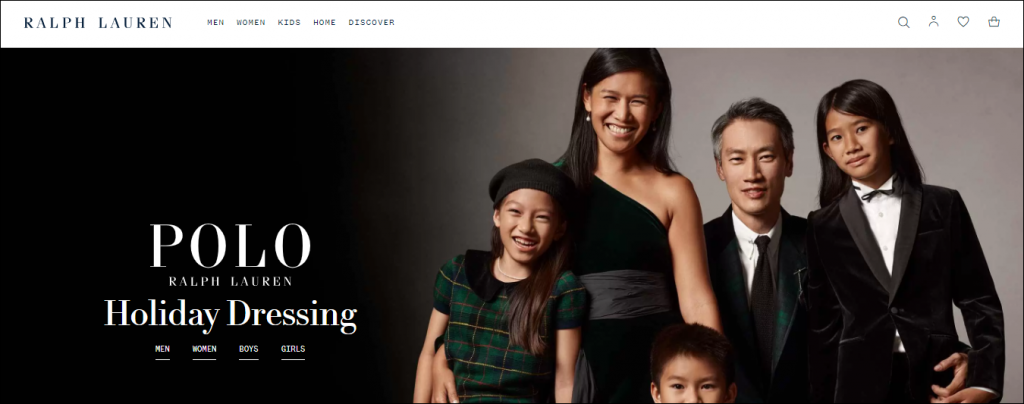
Ralph Lauren, the iconic brand synonymous with American preppy style, has captivated the world of fashion for over five decades. Its timeless designs, rooted in classic American sportswear and refined elegance, have transcended generations and established a global reputation for sophistication and effortless cool.
A Visionary Designer
Ralph Lauren’s journey began in 1967 when, with a vision of creating a new kind of American menswear, he introduced a collection of ties under his own label. His designs, characterized by their impeccable tailoring and refined details, quickly gained recognition among discerning gentlemen.
Lauren’s success in menswear paved the way for his expansion into women’s apparel, home décor, and fragrances. His collections consistently embodied his signature style, blending traditional American sportswear elements with modern sensibilities, creating a wardrobe that was both stylish and enduring.
A Legacy of Iconic Designs
Ralph Lauren’s designs have left an indelible mark on the fashion landscape. The brand’s iconic polo shirt, with its embroidered pony logo, has become a symbol of preppy style, while its tailored suits and elegant dresses exude timeless sophistication.
Lauren’s creations have also graced the silver screen, dressing iconic characters in films such as “Annie Hall,” “The Great Gatsby,” and “The Devil Wears Prada.” These cinematic appearances further cemented the brand’s association with glamour and Hollywood allure.
A Global Fashion Empire
Ralph Lauren has grown from a humble menswear start-up to a global fashion empire, with a presence in over 120 countries worldwide. The brand’s flagship store on Fifth Avenue in New York City stands as a testament to its success, offering a curated selection of apparel, accessories, and home décor that reflects Lauren’s vision of refined American style.
A Commitment to Quality and Craftsmanship
Ralph Lauren has always been committed to the highest standards of quality and craftsmanship. The brand’s products are meticulously crafted from premium materials, ensuring their durability and timeless appeal. Lauren’s attention to detail is evident in every stitch and seam, reflecting his deep respect for the art of tailoring and garment construction.
A Brand for All Seasons
Ralph Lauren’s designs seamlessly transition from season to season, offering a versatile wardrobe that caters to a wide range of occasions. From casual weekend wear to formal evening attire, Lauren’s collections provide a refined and effortlessly stylish solution for every aspect of one’s life.
A Legacy of Inspiration
Ralph Lauren’s influence extends far beyond the realm of fashion. The brand’s designs have inspired generations of individuals seeking to embrace a lifestyle of sophistication and effortless cool. Lauren’s vision of American style has transcended cultural boundaries, becoming a global symbol of elegance and timeless appeal.
Ralph Lauren stands as a beacon of American style, epitomizing the essence of classic sportswear and refined elegance. Its timeless designs, unwavering commitment to quality, and global appeal have solidified the brand’s legacy as a fashion icon. As Ralph Lauren continues to evolve and adapt to the ever-changing fashion landscape, its impact on the world of style is sure to endure for generations to come.
3. Everlane
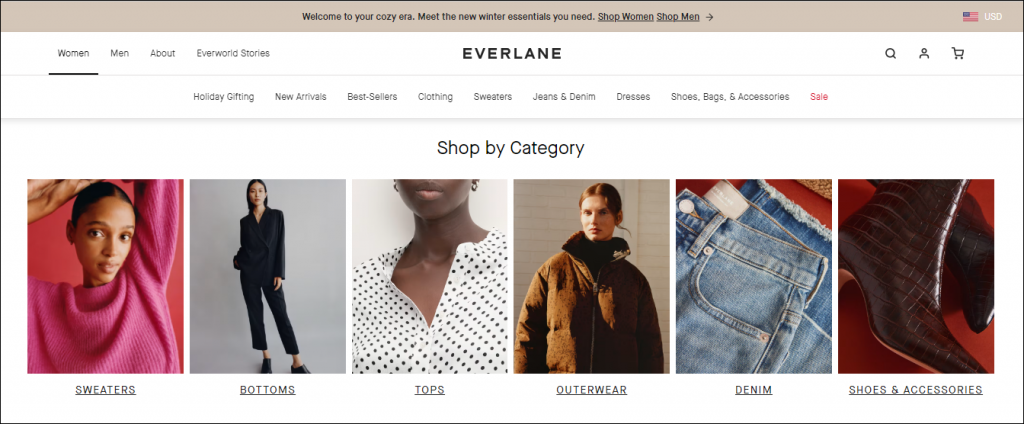
In the bustling world of fashion, Everlane stands out as a beacon of radical transparency and ethical practices. Founded in 2010 with a mission to make exceptional quality, ethically produced clothing accessible to everyone, Everlane has disrupted the industry, challenging traditional notions of fashion and consumerism.
Radical Transparency: Unmasking the True Cost of Clothing
Everlane’s philosophy revolves around radical transparency, a commitment to sharing the true cost of each of its products. From the factory to the consumer, Everlane breaks down the pricing process, revealing the costs of materials, labor, and transportation. This level of transparency empowers consumers to make informed decisions about their purchases, fostering a deeper understanding of the ethical implications of their clothing choices.
Ethical Manufacturing: Prioritizing Workers’ Well-being
Everlane is committed to ensuring that its products are made by workers who are treated with respect and dignity. The company partners with factories that adhere to strict ethical standards, ensuring fair wages, safe working conditions, and compliance with labor laws. Everlane’s dedication to ethical manufacturing extends beyond its own factories, as it works closely with its suppliers to ensure that ethical practices are upheld throughout its supply chain.
Exceptional Quality: Elevating Everyday Essentials
Despite its focus on transparency and ethics, Everlane never compromises on quality. The brand carefully selects materials, from Pima cotton to premium cashmere, ensuring that its products are durable, comfortable, and stylish. Everlane’s designs are rooted in simplicity and functionality, offering a range of wardrobe essentials that transcend fleeting trends.
A Sustainable Approach to Fashion
Everlane recognizes the environmental impact of the fashion industry and is committed to reducing its footprint. The company uses eco-friendly materials, such as organic cotton and recycled polyester, whenever possible. It also implements sustainable practices, such as reducing waste and minimizing water usage in its manufacturing processes.
Championing Sustainable Innovation
Everlane continuously seeks innovative ways to minimize its environmental impact. The brand has introduced eco-friendly packaging solutions, such as recycled and biodegradable materials, and has partnered with organizations that promote sustainable practices in the fashion industry. Everlane’s commitment to sustainability extends beyond its products, as it encourages consumers to adopt eco-conscious practices, such as extending the lifespan of their clothing and participating in circular fashion initiatives.
Community Engagement: Fostering a Dialogue
Everlane actively engages with its community, fostering open dialogue about ethical fashion and sustainable practices. The brand regularly shares updates on its ethical initiatives, invites feedback from consumers, and collaborates with like-minded organizations to promote positive change in the fashion industry.
Everlane has emerged as a pioneer in ethical fashion, challenging the status quo and inspiring a more conscious approach to consumerism. Through radical transparency, ethical manufacturing, and a commitment to sustainability, Everlane is redefining the way we think about fashion, one garment at a time. As the brand continues to innovate and engage with its community, its impact on the fashion industry is sure to grow, paving the way for a more sustainable and ethical future for apparel.
4. New Balance

New Balance, the iconic footwear brand with the “N” logo, stands as a testament to comfort, performance, and innovation. Its unwavering commitment to quality and technological advancements has earned it a loyal following among athletes, casual wearers, and fashion enthusiasts alike.
A History of Innovation
New Balance’s story began in 1906 when William J. Riley, an immigrant from England, founded the New Balance Arch Support Company in Boston, Massachusetts. Riley, inspired by the comfort of chicken coops, designed shoes with arch supports that provided better balance and support.
Over the decades, New Balance has continued to push the boundaries of footwear innovation. In 1972, the brand introduced its first running shoe, the Trackster, which featured a ripple sole design for superior traction and cushioning. This revolutionary design marked a turning point in New Balance’s history, establishing its reputation as a pioneer in performance footwear.
Since then, New Balance has introduced a series of groundbreaking technologies, including:
- ENCAP technology: Encapsulated polyurethane midsole provides lightweight cushioning and shock absorption.
- ABZORB technology: Energy-absorbing heel cushioning to reduce impact on the joints.
- FantomFit technology: Seamless, lightweight upper construction for a comfortable, sock-like fit.
A Force in Sports and Fashion
New Balance’s impact extends far beyond the world of sports. Its stylish designs have transcended the athletic arena, becoming a staple in everyday fashion. The brand’s signature sneakers, such as the 574, 997, and 1500, have become cultural icons, worn by celebrities, fashion bloggers, and individuals seeking a comfortable and stylish everyday shoe.
New Balance’s collaborations with fashion designers and streetwear brands have further solidified its position in the fashion world. Partnerships with high-end designers like JJJJound and Aimé Leon Dore have brought a touch of luxury to New Balance’s classic silhouettes, while collaborations with streetwear brands like Supreme and Stüssy have infused its designs with a touch of urban cool.
A Commitment to Social Responsibility
New Balance has a long history of social responsibility. The company is committed to manufacturing its shoes in the United States, maintaining several factories in New England to support local communities. New Balance has also been recognized for its environmental initiatives, such as using recycled materials in its footwear and reducing its carbon footprint.
In recent years, New Balance has made significant strides in promoting diversity and inclusion within its workforce and marketing campaigns. The company has partnered with organizations like the NAACP and the National Urban League to support diversity initiatives and has featured models of all backgrounds in its advertising.
New Balance’s legacy is one of comfort, performance, and innovation. The brand has revolutionized the way we think about footwear, providing athletes with the tools to excel and casual wearers with stylish and comfortable options for everyday life. New Balance’s commitment to quality, social responsibility, and innovation ensures that its impact on the world is sure to grow even stronger in the years to come.
5. Victoria’s Secret

Victoria’s Secret, the iconic lingerie brand with its angel wings and runway shows, has long been a symbol of beauty, glamour, and sensuality. However, the brand has also faced criticism for its narrow definition of beauty, its hypersexualized marketing, and its alleged exploitation of workers.
A History of Glamour and Spectacle
Victoria’s Secret was founded in 1977 by Roy Raymond, who sought to create a lingerie store where men could feel comfortable purchasing intimate apparel for their partners. The brand quickly gained popularity for its feminine designs and upscale ambiance, becoming a destination for women seeking luxurious lingerie.
In the 1990s, Victoria’s Secret took lingerie marketing to new heights with its extravagant fashion shows, featuring scantily clad models known as “Angels.” These shows, broadcast on national television, became a cultural phenomenon, solidifying the brand’s association with glamour and sex appeal.
A Narrow Definition of Beauty
Victoria’s Secret has been criticized for its narrow definition of beauty, often featuring tall, slender models with conventionally attractive features. This has led to accusations that the brand promotes unrealistic beauty standards and contributes to body image issues, particularly among young women.
Hypersexualized Marketing
Victoria’s Secret’s advertising campaigns have also been criticized for their hypersexualized nature, often portraying women in suggestively posed scenarios. Detractors argue that these campaigns reinforce harmful gender stereotypes and objectify women.
Alleged Exploitation of Workers
Victoria’s Secret has faced allegations of exploiting workers in its supply chain, with reports of low wages, excessive overtime, and unsafe working conditions. These accusations have tarnished the brand’s reputation and raised concerns about its ethical practices.
A Brand in Transition
In recent years, Victoria’s Secret has faced increasing pressure to address these criticisms. The brand has made some efforts to diversify its models, including featuring more women of color and different body types. However, many argue that these changes have not been significant enough to dispel the brand’s long-standing image.
Despite the controversies, Victoria’s Secret remains a significant player in the lingerie industry. The brand’s marketing campaigns still generate buzz, and its products remain popular among many women. However, the brand’s future success will depend on its ability to address its critics and adapt to a changing cultural landscape.
Victoria’s Secret is a complex brand with a rich history and a troubled present. While its glamorous image and innovative designs have made it a cultural icon, its narrow definition of beauty, hypersexualized marketing, and alleged exploitation of workers have tarnished its reputation. As the brand continues to evolve, it remains to be seen whether it can overcome these challenges and redefine its legacy for the 21st century.
6. Under Armour
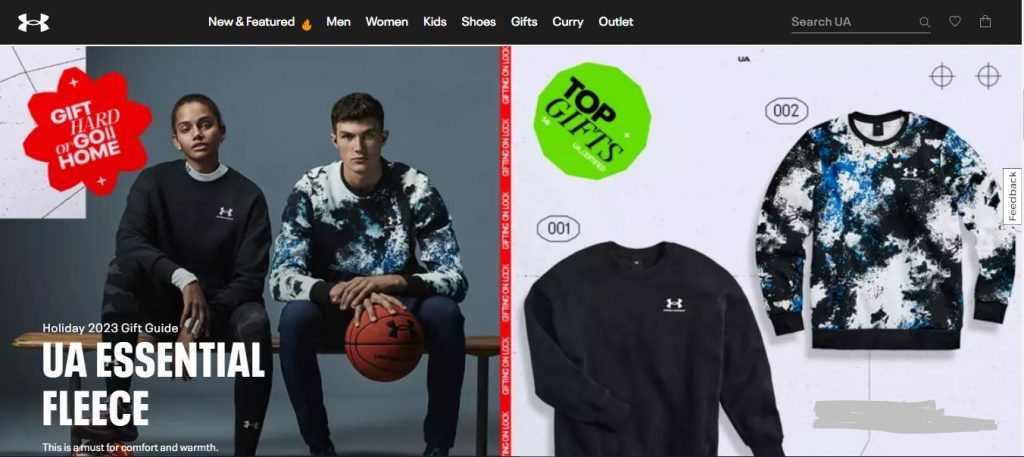
Under Armour, the iconic brand with the interlocking UA logo, has established itself as a global leader in performance apparel and footwear. Its unwavering commitment to innovation and athlete-driven design has revolutionized the sportswear industry, empowering athletes to push their limits and reach new heights.
A History of Innovation
Under Armour’s story began in 1996 when Kevin Plank, a former University of Maryland football player, sought to create a moisture-wicking fabric that would keep athletes cool and dry during intense workouts. Plank’s vision led to the development of Under Armour’s signature HeatGear fabric, which quickly gained popularity among athletes for its performance-enhancing properties.
Since then, Under Armour has continued to push the boundaries of innovation, introducing a series of groundbreaking technologies, including:
- ColdGear technology: Traps body heat to keep athletes warm in cold conditions.
- All-Season Gear technology: Adapts to changing body temperature to maintain optimal comfort.
- UA RUSH technology: Uses infrared energy to reflect back into the body, enhancing blood flow and muscle recovery.
Under Armour’s commitment to innovation has not only transformed the sportswear industry but has also earned the brand numerous accolades, including multiple Footwear Innovation of the Year awards from Footwear Plus.
A Force in Sports and Fashion
Under Armour’s impact extends far beyond the world of sports. Its stylish designs have transcended the athletic arena, becoming a staple in everyday fashion. The brand’s signature sneakers, such as the Curry and HOVR lines, have become cultural icons, worn by celebrities, fashion enthusiasts, and athletes alike.
Under Armour’s sponsorship deals with some of the world’s most celebrated athletes, including Stephen Curry, Dwayne “The Rock” Johnson, and Tom Brady, have further cemented its status as a global powerhouse. These partnerships have not only enhanced the brand’s visibility but have also inspired generations of athletes and fans.
A Commitment to Sustainability
In recent years, Under Armour has made significant strides in addressing environmental issues. The company has implemented initiatives to reduce its environmental footprint, including:
- Using recycled materials in its products.
- Reducing water usage in its manufacturing processes.
- Promoting sustainable practices among its suppliers.
Under Armour’s efforts have been recognized by various organizations, including the Sustainable Apparel Coalition and the Fair Labor Association. The company has also been praised for its commitment to ethical labor practices, ensuring fair wages and safe working conditions for its employees.
Under Armour’s legacy is one of innovation, athletic excellence, and social responsibility. The brand has revolutionized the way we think about sportswear, empowering athletes to perform at their best while also making a positive impact on the environment and society. As Under Armour continues to innovate and adapt to the ever-changing landscape of sports and fashion, its influence on the world is sure to grow even stronger.
7. Coach

Coach, the iconic brand with the horse-and-carriage logo, has epitomized American luxury fashion for over 80 years. Its timeless designs, rooted in exquisite craftsmanship and premium leather goods, have captivated generations of style enthusiasts worldwide.
A History of Heritage and Craftsmanship
Coach’s story began in 1941 in a small New York City workshop, where Miles Cahn and Lillian Haas sought to create durable and functional leather goods for everyday use. Their vision led to the development of Coach’s signature Duffle Bag, a rugged and stylish bag that quickly gained popularity among New York City commuters.
Over the decades, Coach has remained true to its roots, prioritizing craftsmanship and attention to detail in every product it creates. The brand’s skilled artisans meticulously handcraft each piece, using only the finest leathers and materials. This dedication to quality has earned Coach a reputation for enduring style and timeless elegance.
A Legacy of Iconic Designs
Coach has introduced a series of iconic designs that have become synonymous with the brand. The Duffle Bag, with its signature leather straps and brass buckles, remains a timeless classic. The Legacy Tote, with its structured shape and elegant hardware, has become a staple for women seeking a sophisticated and versatile bag.
Coach’s footwear has also gained prominence, particularly with the introduction of the Coach Bootie, a stylish and comfortable ankle boot that has become a wardrobe essential for many women. The brand’s sneakers, combining classic designs with modern touches, have also found favor among fashion-conscious individuals.
A Global Fashion Powerhouse
Coach has grown from its humble beginnings to become a global fashion powerhouse. The brand’s products are available in over 120 countries worldwide, with flagship stores in major cities across the globe. Coach’s presence in the luxury fashion market has been solidified through collaborations with renowned designers, such as Stuart Vevers and Victor Luis, who have infused the brand’s designs with a touch of contemporary flair.
A Commitment to Social Responsibility
Coach is committed to ethical and sustainable practices throughout its supply chain. The company has implemented initiatives to ensure fair wages, safe working conditions, and environmental responsibility among its suppliers. Coach has also been recognized for its philanthropic endeavors, supporting various organizations that promote education, arts, and social well-being.
Coach stands as a beacon of American luxury fashion, embodying timeless elegance and enduring craftsmanship. Its iconic designs, rooted in heritage and innovation, have captivated generations of style enthusiasts worldwide. As Coach continues to evolve and adapt to the ever-changing fashion landscape, its legacy is sure to endure, ensuring its position as a global leader in luxury apparel and accessories.
8. Converse
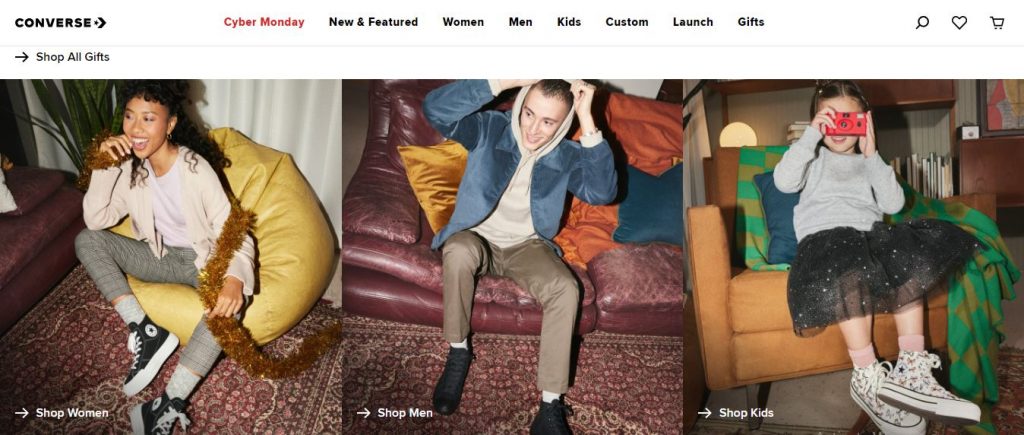
Converse, the iconic brand with the star-and-chevron logo, has epitomized casual cool and timeless style for over a century. Its Chuck Taylor All-Stars sneakers, with their simple canvas design and vulcanized rubber soles, have become a cultural icon, transcending generations and fashion trends.
A History of Innovation and Athletic Roots
Converse’s story began in 1908 when Marquis Mills Converse founded the Converse Rubber Shoe Company in Malden, Massachusetts. The company initially produced rubber boots and galoshes, but in 1917, it introduced the Converse All-Star basketball shoe, named after basketball legend Chuck Taylor.
Taylor, who became a brand ambassador for Converse, advocated for the shoe’s design and performance, helping to popularize it among athletes and everyday wearers alike. The All-Stars quickly gained popularity for their comfort, durability, and affordable price, becoming a staple on basketball courts and beyond.
A Cultural Icon and Fashion Staple
The Converse All-Stars have transcended their athletic origins to become a cultural icon and fashion staple. Their simple yet versatile design has made them a favorite among individuals of all ages and backgrounds, from musicians and artists to skaters and fashion enthusiasts.
The All-Stars have been featured in countless movies, television shows, and music videos, further solidifying their status as a pop culture phenomenon. Their popularity has also been fueled by collaborations with various brands and celebrities, resulting in unique and limited-edition designs.
A Commitment to Sustainability
In recent years, Converse has made significant strides in reducing its environmental impact. The company has implemented initiatives to reduce waste, conserve water, and use recycled materials in its products. Converse has also partnered with organizations that promote sustainability in the fashion industry.
The brand’s efforts have been recognized by various organizations, including the Sustainable Apparel Coalition and the Fair Labor Association. Converse has also been praised for its commitment to ethical labor practices, ensuring fair wages and safe working conditions for its employees.
Converse stands as a testament to the power of simplicity and timeless design. Its Chuck Taylor All-Stars sneakers have become a cultural icon, representing effortless cool and versatility. As Converse continues to innovate and adapt to the ever-changing fashion landscape, its impact on the world is sure to endure, ensuring its position as a global leader in casual footwear.
9. Michael Kors
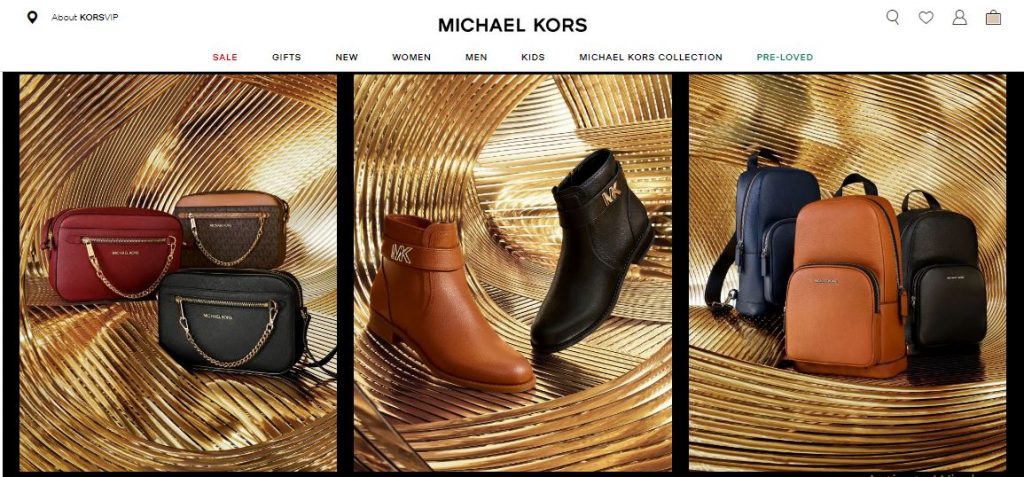
Michael Kors, the iconic brand with the intertwined MK logo, has epitomized jet-set glamour and refined elegance for over four decades. Its luxurious handbags, watches, and ready-to-wear apparel have captivated celebrities, fashion enthusiasts, and individuals seeking a touch of effortless luxury worldwide.
A Vision of American Jet-Set Lifestyle
Michael Kors’s journey began in 1981 when he launched his own women’s fashion label, inspired by the glamorous lifestyle of New York City’s elite. His designs, characterized by their sophisticated silhouettes and luxurious fabrics, quickly gained recognition among discerning fashionistas.
In 1990, Kors introduced his first menswear line, further expanding his brand’s appeal and establishing his reputation as a designer who could seamlessly blend American sportswear elements with refined elegance. His collections, often featuring tailored suits, crisp shirts, and stylish accessories, embodied the essence of effortless cool and understated luxury.
A Global Fashion Empire
Michael Kors has grown from a small New York fashion label into a global fashion empire, with a presence in over 120 countries worldwide. The brand’s flagship stores, often located in prime locations of major cities, exude an atmosphere of glamour and sophistication, reflecting the essence of the Kors aesthetic.
Michael Kors’s success can be attributed to his ability to capture the zeitgeist of contemporary fashion while maintaining a timeless appeal. His designs are rooted in classic American sportswear, but they are also infused with modern touches and luxurious details, making them relevant to fashion-conscious individuals across generations.
A Champion of American Luxury
Michael Kors has been credited with redefining American luxury fashion, bringing a touch of jet-set glamour and effortless sophistication to the world stage. His designs have graced the red carpet, worn by celebrities attending prestigious events such as the Oscars and the Golden Globes.
The brand’s collaborations with renowned figures, such as Beyoncé and Naomi Campbell, have further cemented its status as a leader in luxury fashion. These partnerships have not only enhanced the brand’s visibility but also solidified its association with glamour and celebrity.
A Commitment to Social Responsibility
In recent years, Michael Kors has made significant strides in addressing social and environmental issues. The company has implemented initiatives to improve labor practices in its supply chain, reduce its environmental footprint, and promote diversity and inclusion within its workforce.
Michael Kors’s commitment to social responsibility has been recognized by various organizations, including the Fair Labor Association and the Human Rights Watch. The company has also been praised for its efforts to empower women and girls through initiatives such as its Michael Kors Wonderlust Scholarship Program.
Michael Kors stands as a beacon of American luxury fashion, embodying jet-set glamour, refined elegance, and a commitment to social responsibility. Its timeless designs, unwavering dedication to quality, and global appeal have solidified the brand’s legacy as a fashion icon. As Michael Kors continues to evolve and adapt to the ever-changing fashion landscape, its impact on the world is sure to grow even stronger.
10. Calvin Klein
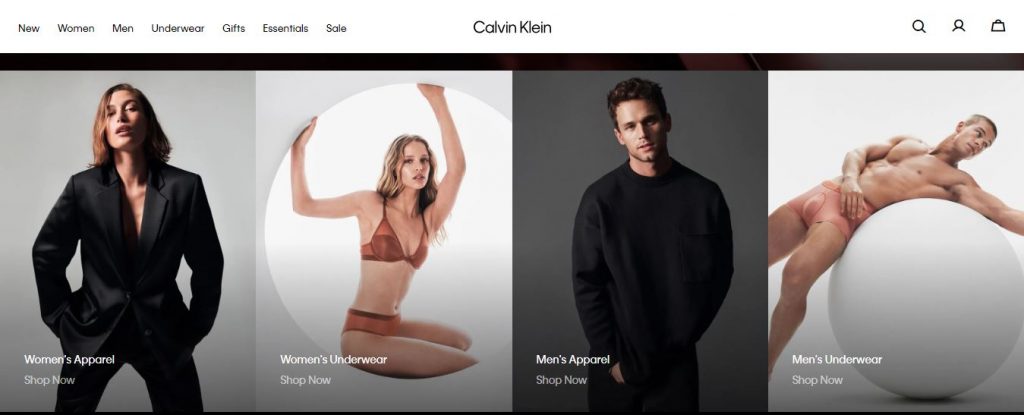
Calvin Klein, the iconic brand with the stylized CK logo, has revolutionized the fashion industry with its minimalist designs, provocative advertising campaigns, and unapologetic embrace of sensuality. From its iconic underwear line to its sophisticated ready-to-wear collections, Calvin Klein has consistently pushed boundaries and challenged conventional notions of fashion and beauty.
A Pioneer of Minimalism
Calvin Klein’s story began in 1968 when the designer launched his own fashion label in New York City. His designs were characterized by their clean lines, simple silhouettes, and neutral colors, epitomizing the minimalist aesthetic that would become synonymous with the brand.
Klein’s minimalist approach extended beyond clothing design, influencing the brand’s overall aesthetic, including its packaging, advertising, and store design. This commitment to simplicity and understated elegance resonated with consumers, establishing Calvin Klein as a leader in the fashion world.
Provocative Advertising and Sensuality
Calvin Klein’s advertising campaigns have played a significant role in the brand’s success, often sparking controversy and pushing boundaries of what was considered acceptable in mainstream advertising. The brand’s provocative imagery, often featuring scantily clad models and suggestive poses, challenged traditional norms and captured the attention of the public.
Klein’s iconic “Obsession” and “CK One” campaigns, featuring celebrities such as Kate Moss and Mark Wahlberg, further cemented the brand’s association with sensuality and provocation. These campaigns, while controversial, were highly successful in raising brand awareness and solidifying Calvin Klein’s reputation as a bold and daring fashion brand.
A Legacy of Innovation and Influence
Calvin Klein’s impact on the fashion industry extends far beyond its minimalist designs and provocative advertising. The brand has been recognized for its innovative approach to materials, its commitment to quality craftsmanship, and its ability to capture the zeitgeist of contemporary culture.
Klein’s influence is evident in the work of countless other designers and brands, who have adopted his minimalist aesthetic and embraced his unapologetic approach to sensuality. The brand’s impact on popular culture is also undeniable, with its iconic underwear line and provocative advertising campaigns becoming part of the collective consciousness.
A Brand in Transition
In recent years, Calvin Klein has faced challenges in maintaining its relevance and appeal in a rapidly changing fashion landscape. The brand has undergone several leadership changes and has struggled to recapture the cultural impact of its earlier campaigns.
Despite these challenges, Calvin Klein remains a significant player in the fashion industry, with a global presence and a loyal following. The brand’s legacy of minimalism, sensuality, and provocation continues to inspire and influence designers and consumers alike.
Calvin Klein stands as a testament to the power of bold ideas and unapologetic creativity in the fashion industry. Its minimalist designs, provocative advertising, and commitment to sensuality have revolutionized the way we think about fashion and beauty. As Calvin Klein continues to evolve and adapt to the ever-changing fashion landscape, its impact on the world is sure to endure.
Final Thoughts
In conclusion, the eight brands discussed in this report have all left an indelible mark on the fashion industry. Each brand has its unique story, design aesthetic, and contributions to fashion culture. Their impact spans across genders, generations, and cultures, and has helped to shape the way we view fashion and beauty.
As we look to the future, it is exciting to see how these brands will continue to innovate, adapt, and inspire. Their legacy serves as a reminder that fashion is not just about trends and fleeting moments, but about expressing individuality, challenging norms, and creating lasting cultural connections.



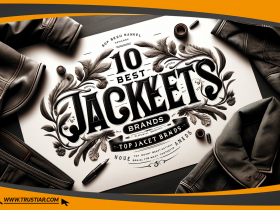





Leave a Reply